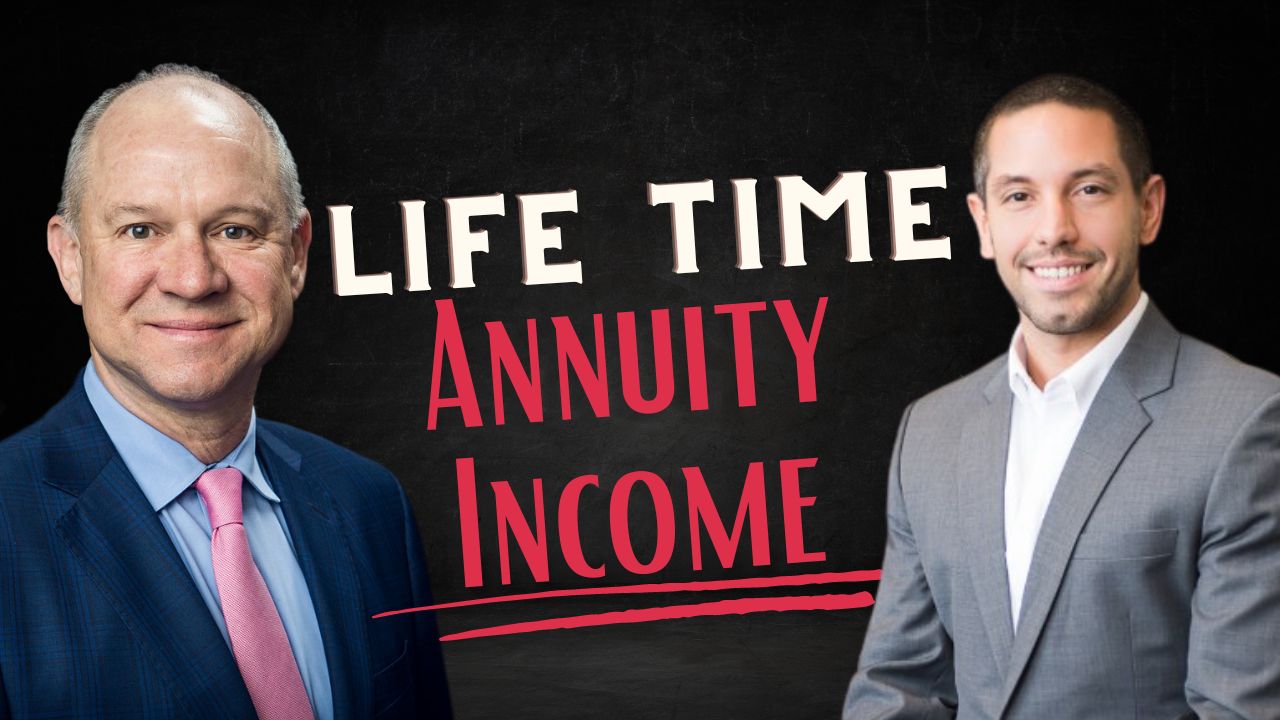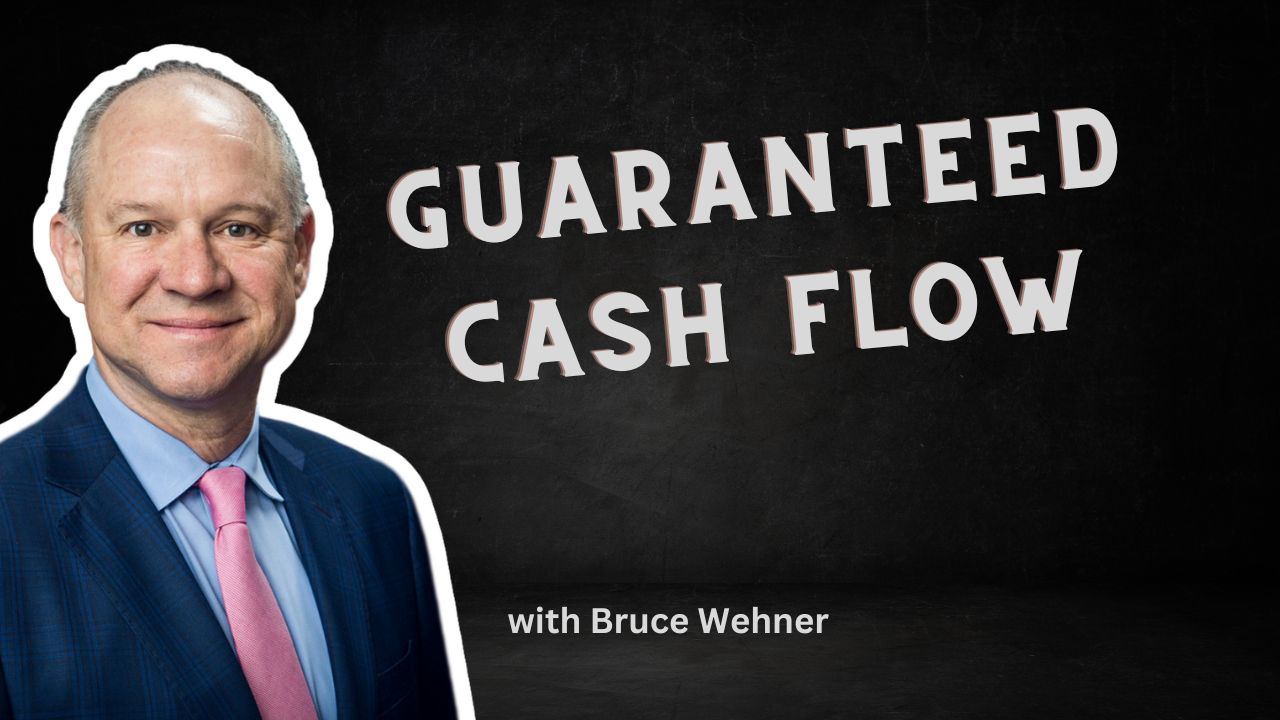
Lifetime Annuity Income
By popular demand, we will be continuing our conversations from last week on annuity strategies! This time, we are joined by special guest Joseph DeFazio! Joe is a seasoned financial educator and will bring a fresh perspective on lifetime annuity income and how annuities can benefit your financial life!
If you’re interested in guaranteed lifetime income, then this video is for you! We’ll discuss the different types of annuities and explain the basics of lifetime annuity income.
Podcast: Play in new window | Download (Duration: 1:06:48 — 76.5MB)
Subscribe: Apple Podcasts | Spotify | Android | Pandora | RSS | More
Table of Contents
Annuities: Risk Transfer
[11:10] “An annuity is a private contract that completely transfers the risk of outliving your money to the insurance company in exchange for a premium payment. The insurance company uses bonds and [then] layers on actuarial calculations, actuarial science, that pools the risk so they can guarantee an income stream for as long as your contract specifies.”
In other words, an annuity is the inverse of whole life insurance, which transfers the risk of not living long enough to the insurance company (in exchange for a premium). Because insurance companies manage the risk of living too long AND not long enough, they’ve created balance.
How to Structure Your Annuity
There are two phases to an annuity: the accumulation phase and the annuitization phase. During the accumulation phase, you’re funding the annuity, and you can choose either a fixed rate or variable rate, both of which have their pros and cons.
In the annuitization phase, one of the choices you must make is whether you want your benefit now or later. If you choose to start receiving your benefit within 13 months, that’s called an immediate annuity. Any time after that is considered a deferred annuity.
Then, you choose how you want to receive your benefit. You can get a level payment, and increasing payment, or even a variable payment stream that would be tied to an index. The choice will likely depend on how long you expect to take income, compared to how large your annuity is.
And finally, you can choose what types of guarantees you want on that benefit. If you choose to have no guarantees, then the income benefit stops as soon as you pass on. You can also tie an annuity to someone else with a survivorship rider, which would continue to pay the income to a spouse or partner for the remainder of the annuity term.
Another way to structure it is placing a guarantee on the term, like 10 years, where it pays to someone for that term no matter what. You can also choose to simply guarantee a return of premium, so if you pass on before you’ve earned back your initial premium, it will pay a beneficiary until that benchmark.
What is a SPIA?
[15:01] “A person’s idea of an annuity is often tied to a SPIA because this is the description that most people have of an annuity.”
SPIA stands for a single premium immediate annuity. In other words, you pay for the annuity in one lump sum and begin receiving an income within the first 13 months. Since it has its own acronym, it’s what many people are familiar with when the topic of annuities comes up. That being said, a SPIA isn’t for everyone. As you can see above, there are many ways to structure an annuity to work for your particular set of needs and goals.
While the immediate nature of the SPIA may be beneficial to some, there are some things to consider. One of the major benefits of the SPIA is that you’re going to get a much higher rate of return on this than any other annuity. However, these annuities are designed to be more short-term, and any remainder goes to the life insurance company, not a beneficiary.
Generally, the best candidate is someone who is running out of money, is over 85, and wants to create the best possible end-of-life income. It’s certainly not right for everyone, nor is it the only option when it comes to annuities.
Who Should Consider Annuities?
Almost anyone can benefit from looking into annuities, even if they don’t choose to buy them. That’s because most people will find themselves wanting to protect against either longevity risk (living longer than your money) or sequence of returns risk (when you have to take an income, even in a bad market). Annuities can solve both issues by creating guaranteed income without the fear of loss.
Additionally, if you have CDs or bond funds, you should consider annuities. This is because, with bond funds in particular, things can get a bit bumpy. As we’ve seen in the last few years, bonds have dipped as much as equities in some cases. Annuities won’t do this, because they’re designed to support your lifestyle.
Lifetime Annuity Income
When you choose to purchase an annuity, one thing to remember is that there’s an account balance, and there’s a balance that the insurance company calculates the income on. This can get confusing. However, think of your account balance as your actual money. On the other hand, the income account value or benefit-based account value is a phantom number that the insurance company has calculated to guarantee you income off of.
If you choose to have a lifetime benefit income rider, then you really are guaranteed income for the remainder of your life, no matter what. So this phantom number the insurance companies create is based on actuarial science and your personal longevity.
When you buy an annuity, it’s not unusual for the insurance company to offer bonuses. In the example Bruce shares in the podcast, Kathy got an immediate 10% bonus on her $1 million premium. This was a free $100,000 just for signing up. Then, she’s guaranteed to earn a fixed 7% for each year she delays income, up to 15 years. Based on an 8-year deferral and an income factor of 7.25%, she’s looking to get $137,025 of annual income for the rest of her life, starting at age 70. Moreover, if she continues to defer past the 8-year mark her account will continue to grow.
If Kathy deferred for the full 15 years, she would be looking at $211,667 of annual income from age 77 onward. So if Kathy was feeling good through her early to mid-70s, she could keep deferring and let her future income grow. But it would also be available at any point she wanted to start distributions. It’s an incredibly flexible product.
[50:30] “Believe me, insurance companies are experts at risk management.”
Book A Strategy Call
Do you want to coordinate your finances so that everything works together to improve your life today, accelerate time and money freedom, and leave the greatest legacy? We can help! Book an Introductory Call with our team today https://themoneyadvantage.com/calendar/, and find out how Privatized Banking, alternative investments, or cash flow strategies can help you accomplish your goals better and faster. That being said, if you want to find out more about how Privatized Banking gives you the most safety, liquidity, and growth… plus boosts your investment returns, and guarantees a legacy, go to https://privatizedbankingsecrets.com/freeguide to learn more.
Annuity Strategies: The Truth About Generating Cash Flow with Annuities
Are you interested in knowing the truth about generating guaranteed cash flow with annuity strategies? Learn about the benefits and drawbacks of annuities, as well as some annuity strategies that will help you create guaranteed cash flow. Are annuities the unsung heroes of guaranteed retirement income flow, or are they just another intricate financial product…
Read MoreUsing Reverse Mortgages in a Responsible Retirement Income Plan, with Dr. Wade Pfau
Reverse mortgages are becoming more mainstream. But to benefit from using one, you need to understand how to incorporate it into a responsible retirement income plan. So exactly what is a reverse mortgage? What role should it fill in your retirement planning? And should you open a reverse mortgage early or as a last resort? To…
Read More



Hello I have been listening to your podcast and getting motivated again on the infinite banking. We have 3 policies. and this last week my advisor informed me that one had MEC’ed and gave me my options. Which none are very good because now I can no long contribute to this policy. I was considering starting another policy but now I am fearful of another MEC. Bruce had mentioned on one of his podcast , in reference to something else but if someone had a concern he would give a second option. I have my 2 policy illustrations that were sent to me, on showing me continuring to contribute but now after tax, and one no further contributions EVER> I am at a loss. would it be possible to have a quick consultation. I think we could be done in 10 minutes. thank you 361-537-7087
Thank you for reaching out! Sorry to hear you are having this experience. We will reach out to you!